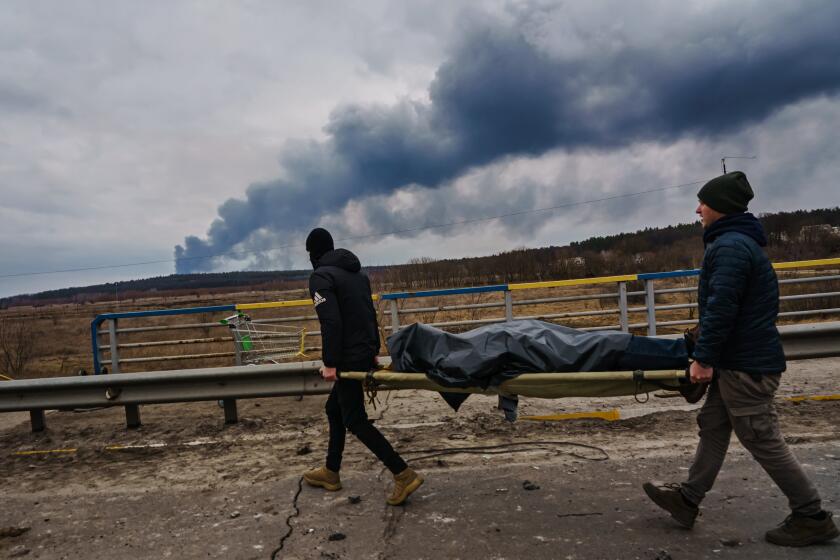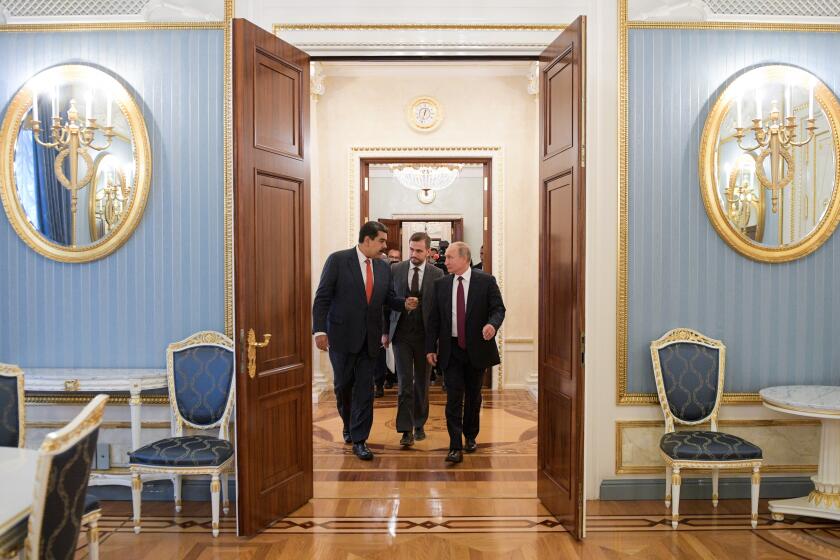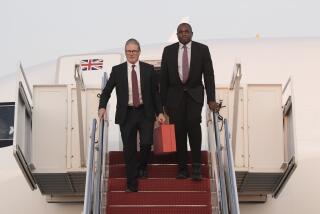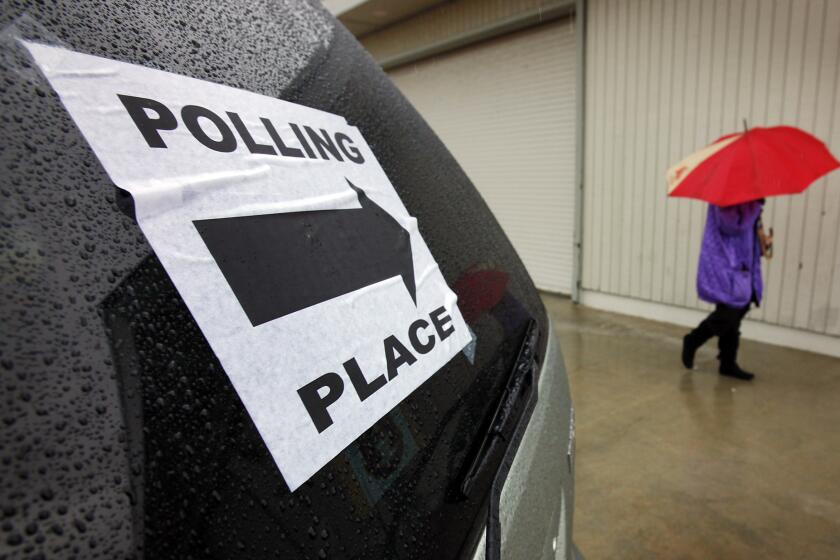U.S. considers banning Russian oil and easing sanctions on Venezuela
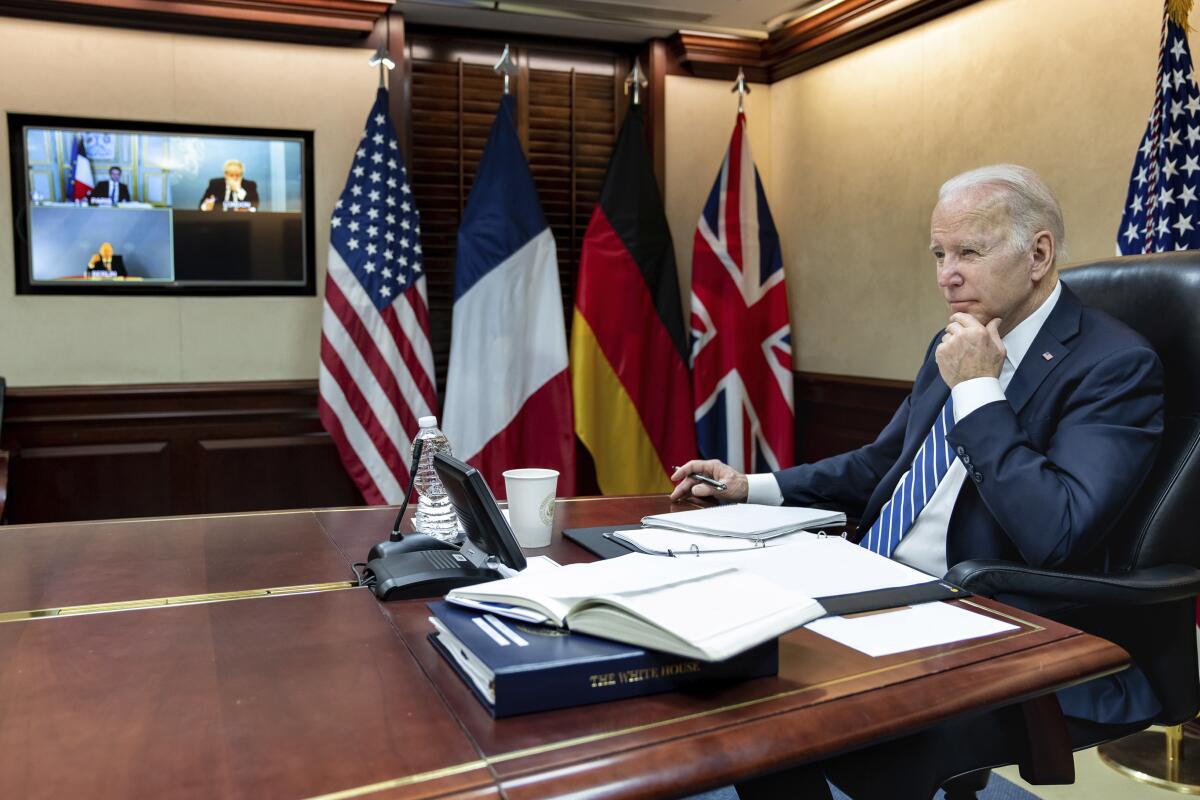
WASHINGTON — President Biden is considering a ban on imports of Russian oil while weighing actions that would boost energy production by autocracies in the hopes of mitigating the effects on American consumers and global energy markets, U.S. officials said.
“What the president is most focused on is ensuring we are continuing to take steps to deliver punishing economic consequences on [Russian President Vladimir] Putin while taking all action necessary to limit the impact to prices at the gas pump,” White House Press Secretary Jen Psaki said Monday.
Until now, the economic strangulation of Russia by the West over its unprovoked invasion of Ukraine has avoided its robust energy sector, with administration officials suggesting that such a move could weaken the global economy.
But as Russia increases its unrelenting bombardment of Ukrainian cities, political pressure on the West has grown to do more to put pressure on Putin to stop the onslaught. U.S. officials said the Biden administration is considering easing restrictions on imports of oil from Venezuela to alleviate the void left by Russian oil bans, a politically problematic step.
It has also sought to convince Saudi Arabia, which has been under fire from U.S. and European officials over its human rights record, to boost oil production.
Biden spoke Monday for more than an hour with German Chancellor Olaf Scholz, French President Emmanuel Macron and British Prime Minister Boris Johnson, although the official White House readout of the conversation did not explicitly state that they discussed a ban on Russian energy.
According to the White House, “the leaders affirmed their determination to continue raising the costs on Russia for its unprovoked and unjustified invasion of Ukraine. They also underscored their commitment to continue providing security, economic and humanitarian assistance to Ukraine.”
Psaki said administration officials were also discussing whether the U.S. would send military aircraft to Poland should its leaders provide Soviet-era bombers to support Ukraine, but noted that the White House was not “preventing or blocking or discouraging” officials in Warsaw. “They are a sovereign country. They make their own decisions, but it is not as easy as just moving planes around,” she said.
Hundreds of thousands of people seek to flee Ukrainian cities under heavy assault by Russia. The Pentagon sends 500 more U.S. troops to Europe.
The U.S. has been reluctant to get ahead of European allies in responding to Putin’s aggression. And while an oil embargo from Washington would have some effect, doing so in concert with Europe would deliver a far greater impact. Europe imports 4 million barrels of Russian oil a day, compared with 700,000 barrels imported daily by the U.S.
U.S. Secretary of State Antony J. Blinken said Sunday during an interview with CNN that the administration was indeed exploring the “prospect” of an energy ban “in a coordinated way” with allies, although he did not rule out the possibility that Washington could act on its own to bar Russian oil.
The administration may not have much of a choice. Members of both political parties have introduced bills in both houses of Congress to block such imports.
“We may have to pay more at the pump because of this attack and our bipartisan response, but it is worth it to ensure that Putin pays the price for his paranoid adventurism and his attack on a peaceful democracy,” Rep. Jimmy Panetta (D-Carmel Valley), who has co-sponsored a bill to ban Russian oil, said in a statement.
Rep. Lou Correa (D-Santa Ana), who supports the measure, said a Russian oil ban may only have limited success if the U.S. cannot persuade other countries to join the effort.
“I don’t believe Europe and some of the other countries are ready to say no to Russian energy, so that’s the challenge right now,” Correa said in an interview. “Not only does Russia have nukes, but also people have to buy their energy from the Russians.”
Congress is weighing an oil ban as it pushes to pass a measure to send Ukraine billions of dollars in emergency assistance. Senate Majority Leader Charles E. Schumer (D-N.Y.) on Monday called for passage of a $12-billion aid package this week, saying it “will provide both humanitarian and military assistance for Ukraine: funding for refugees, medical supplies, emergency food supplies, as well as funding to support weapons transfers into Ukraine, and help for our eastern flank NATO allies.”
In a letter to House Democrats on Sunday, House Speaker Nancy Pelosi (D-San Francisco) said Congress intended to pass $10 billion in emergency aid for Ukraine as part of a larger government funding measure. The House is also exploring legislation that would “further isolate” Russia from the world economy, Pelosi said.
Banning Russian oil imports would probably lead to higher prices at the pump in the U.S. and globally. Gas is averaging $4 a gallon nationwide, up from $2.77 a year ago, according to AAA. The average price of gas in California during that same period has risen from $3.75 to $5.34.
In a clear signal of how seriously the Biden administration is considering a Russian oil ban, U.S. officials traveled over the weekend to Caracas, Venezuela, for talks about potentially easing sanctions imposed on the South American nation by the Trump administration in 2019. President Trump took that step after declaring President Nicolas Maduro’s election victory a sham and recognizing another politician, Juan Guaido, as the country’s rightful leader, a position Biden has affirmed.
Those measures built upon similar sanctions imposed by President Obama, signaling the long history of trouble Washington has had with Caracas and its socialist leaders.
The Venezuela economy is reeling, despite sitting on some of the world’s largest oil reserves, and Maduro is likely eager to be free of the sanctions. However, his economy and many of his government agencies are deeply intertwined with Russian assets and advisors. Any lenience by the White House toward Maduro, even if it’s driven by a desire to crack down on Putin, could undercut Biden’s messaging about the existential threat that autocracies present to democracies.
Psaki on Monday batted away questions about a potential rapprochement with Caracas, telling reporters that any easing of sanctions was “leaping several stages ahead” of where talks currently stand.
Complicating matters has been Venezuela’s decision to imprison six executives from the Citgo oil company for the last four years. Five are U.S. citizens and the sixth a U.S. permanent resident. They were convicted in show trials on trumped-up embezzlement charges and other crimes, according to their families and human rights activists.
Venezuela, Cuba and Nicaragua — all long-standing allies of Russia — have voiced support for the Russian leader.
Psaki said discussions about the release of the men and sanctions relief were taking place “in different channels,” and not tied together.
Republicans, who have seized on the potential energy crisis to call for stepping up domestic fossil fuel production, have already made clear that they will hit the White House hard should it look to offset any ban on Russian oil by looking to foreign suppliers.
Florida Sen. Marco Rubio criticized Biden in a tweet Sunday, saying: “Rather than produce more American oil, he wants to replace the oil we buy from one murderous dictator with oil from another murderous dictator.”
More to Read
Get the L.A. Times Politics newsletter
Deeply reported insights into legislation, politics and policy from Sacramento, Washington and beyond. In your inbox three times per week.
You may occasionally receive promotional content from the Los Angeles Times.
